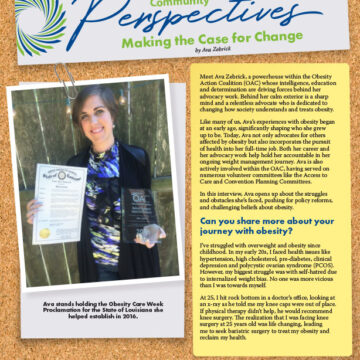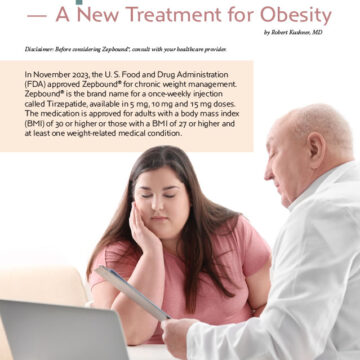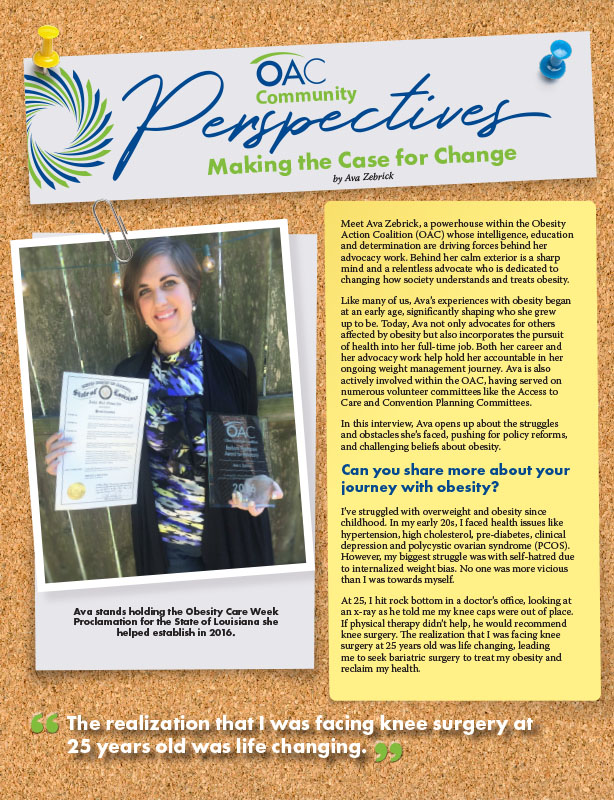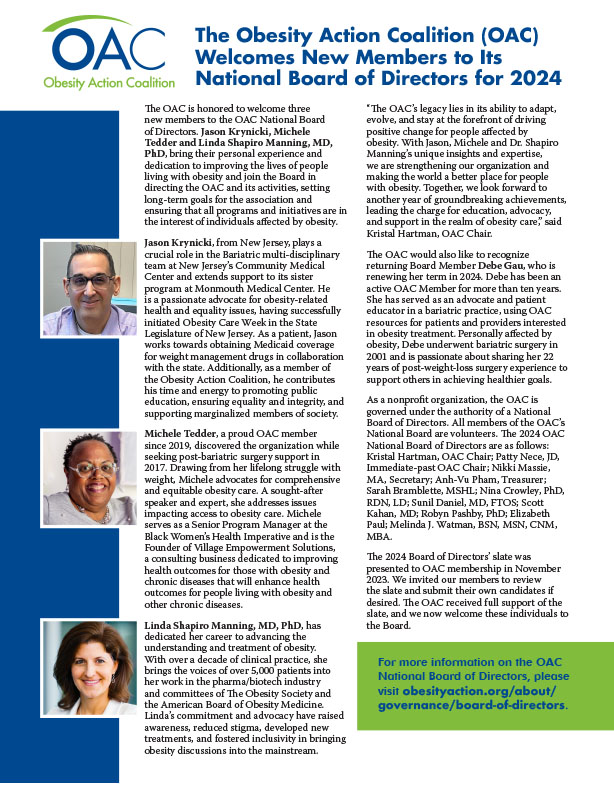Spring Into OAC Action

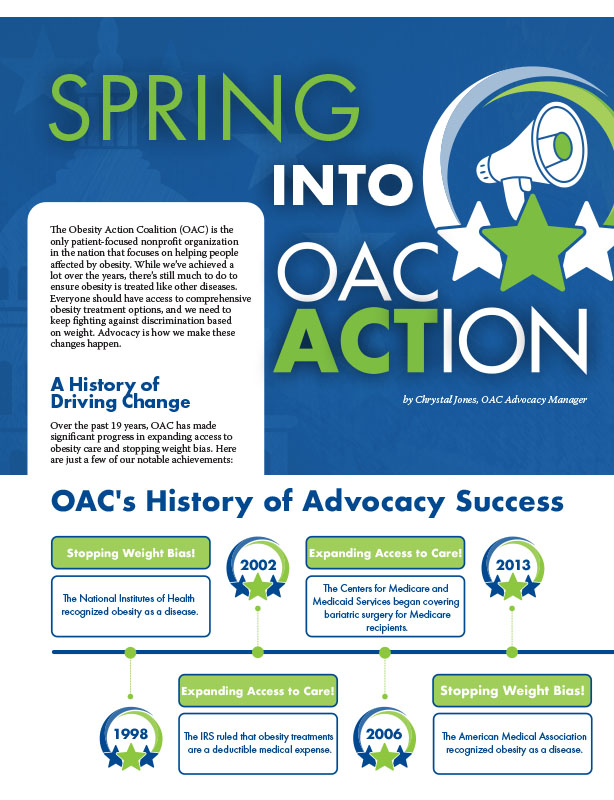
by Chrystal Jones, OAC Advocacy Manager
Spring 2024
The Obesity Action Coalition (OAC) is the only patient-focused nonprofit organization in the nation that focuses on helping people affected by obesity. While we’ve achieved a lot over the years, there’s still much to do to ensure obesity is treated like other diseases. Everyone should have access to comprehensive obesity treatment options, and we need to keep fighting against discrimination based on weight. Advocacy is how we make these changes happen.
A History of Driving Change
Over the past 19 years, OAC has made significant progress in expanding access to obesity care and stopping weight bias. Here are just a few of our notable achievements:
- 1998: Stopping Weight Bias – The National Institutes of Health recognized obesity as a disease.
- 2002: Expanding Access to Care – The IRS ruled that obesity treatments are a deductible medical expense.
- 2006: Expanding Access to Care – The Centers for Medicare and Medicaid Services began covering bariatric surgery for Medicare recipients.
- 2013: Stopping Weight Bias – The American Medical Association recognized obesity as a disease.
- 2020: Stopping Weight Bias – The Centers for Disease Control (CDC) adopted People First Language.
- 2022: Expanding Access to Care – The Office of Personnel Management required coverage of anti-obesity medications (AOMs) for federal employees.
- 2022: Stopping Weight Bias – New York City banned weight-based discrimination.
- 2024: Expanding Access to Care – Medicaid coverage: bariatric surgery – 48 states; AOMs – 1/3 of states. SEHPs: Bariatric surgery – 47 states; AOMs – 1/2 of states.
Looking back at what the OAC has done, we must recognize that advocacy is what made these victories possible. We will continue strengthening our call for change by demanding that decision-makers prioritize obesity care and that people with obesity are treated with dignity and respect. Advocacy can take multiple forms, from simply sharing information about obesity to standing up against examples of weight bias. It can also involve more complex actions, like working with policymakers to change laws and regulations. Advocacy is how we create change!
As Maya Angelou once said, “When we know better, we do better.” Understanding obesity as a disease and prioritizing care for those affected by it is crucial. The field of obesity treatment is growing rapidly, with advancements in research and more treatment options becoming available. But despite this progress, there’s still work to do.
Understanding OAC’s Advocacy Issues
To do better as a society, the OAC focuses our advocacy work on two main areas: stopping weight bias and expanding access to obesity care. There is simply no denying that the barriers we see in accessing obesity treatments are rooted in weight bias. To fix this broken system, we need to address both weight bias and access to care.
Weight bias doesn’t just affect how people view and treat those with obesity; it also influences outdated and unscientific policy barriers that limit treatment options for patients and their healthcare providers. You cannot improve access to obesity treatment without first addressing weight bias. Our organization’s approach of focusing on both issues has led to success, and we believe we can accomplish even more in the years to come. Now is our moment. OAC’s advocacy program is more active than ever. Last year, we worked in nearly 25 states, and in 2024, we’ve already started working in 30 states!
Access to treatment shouldn’t depend on a person’s employer health plan, economic status, or zip code. Insurance should cover recommended treatments for obesity, including support for nutrition, mental and behavioral health services, metabolic and bariatric surgery, and anti-obesity medications (AOMs). Individuals shouldn’t be treated differently because of their weight or size. Obesity is a disease and should be treated like any other, such as hypertension or diabetes. These principles drive our advocacy priorities in 2024 and beyond.
OAC’s Efforts at the National Level
While we’ve made progress in expanding access to care for federal employees, there are still gaps in coverage for those on Medicare. For over 11 years, OAC has worked to improve access to obesity treatments under Medicare by supporting the Treat and Reduce Obesity Act (TROA). History has shown that where Medicare goes, other health plans follow. If passed, TROA would expand access to AOMs and improve access to obesity screening and counseling services. Passing TROA would have a significant impact on how obesity treatments are covered across the country.
OAC’s Efforts at the State Level
Currently, only one state and eight cities have laws against weight-based discrimination. State Medicaid programs don’t cover bariatric surgery in two states, and they don’t cover AOMs in over 30 states. State employee health plans do not cover bariatric surgery in three states, and they don’t cover AOMs in about half of the states. But these treatment paths are just the tip of the iceberg. Comprehensive obesity care must also include support for mental and behavioral health, nutrition, and more.
In 2023, we worked in nearly 25 states to expand access to care and stop weight bias. We testified at hearings, rallied our members to send letters to decision-makers, partnered with national and state allied organizations, and submitted official comment letters encouraging states to create a better world for people with obesity.
In 2024, we will launch proactive advocacy work in four states: California, Florida, Pennsylvania, and Tennessee. Florida and Tennessee have gaps in obesity coverage for Medicaid recipients, and California and Pennsylvania have gaps in coverage for state workers. None of these states have laws against weight-based discrimination. We hope to use these states as examples to expand our work nationwide.
OAC Advocates in Action
We know that simply “being right” doesn’t always lead to getting what you want. Medical debt shouldn’t push American families into financial ruin… but it does. People shouldn’t be treated differently based on their size, race, ethnicity, or disability… but they are. The OAC’s true strength comes from our patient members using their voices to advocate for change. In recent months, both new and experienced OAC advocates have spoken up in legislative briefings, community town hall meetings, educational webinars, meetings on Capitol Hill, on social media, through letters to decision-makers, and more. The power of the OAC lies in the voices of our members.
One such advocate is Jordan from South Carolina. Jordan, a state employee, lacks coverage for the treatment recommended by her physician to improve her health. Jordan’s situation is common: while her husband’s type 2 diabetes treatment is covered by insurance and has led to significant improvements in his health and quality of life, Jordan’s treatment isn’t covered, and the costs are prohibitively high. Her monthly medication costs more than a typical mortgage payment. Like nearly all our members, Jordan does everything she can to stay healthy, but she’s forced to go without essential care due to its expense. She also worries about the long-term consequences of delaying her treatment.
Jordan recently spoke at a statewide event focusing on the economic impacts of obesity in South Carolina. She shared her story as others discussed the economic burden of obesity on both the state and its residents. South Carolina is one of only three states that don’t cover bariatric surgery and one of about two-thirds of states that don’t cover AOMs for state employees like Jordan.
Speaking up is how we drive change, and the OAC has achieved significant victories through our advocacy efforts last year. Weight-based discrimination is now prohibited in New York City, and Connecticut now covers AOMs for Medicaid recipients! Every day, we make progress toward our mission.
Now is the Time to Act!
We need your voice in the fight to create a better world for people with obesity. Your voice is our power, and there are ways for everyone to join in. We offer opportunities for advocates of all levels, whether you’re just starting out or you’ve been involved for a while.
If you’re interested in taking your first step as an OAC Advocate, our Action Center is a great place to start! It’s easy to use, and you can complete actions in just a few minutes. You can do things like asking your government representatives to support better care for people with obesity, urging the FDA to make sure medications are safe and effective for them, and sharing your story. Visit ObesityAction.org/action to get started.
If you want to take part in advocacy events, training sessions and other activities, please fill out our Advocate survey at bit.ly/oac-advocacy-survey.
By working together as advocates, we can make a real difference, and the time to start is now!
Sign Up for OAC Advocacy Alerts!
Keep up to date with OAC’s advocacy newsletter, ImpactNOW, and learn about other opportunities to get involved in our work at ObesityAction.org/get-involved.
Make sure to check the box for alerts about key advocacy issues!
About the Author:
Chrystal Jones, OAC Advocacy Manager, joined the OAC team in 2021. She is responsible for the coordination and execution of OAC’s advocacy and awareness initiatives and activities in key issue areas. Chrystal has dedicated over 16 years to working in nonprofit organizations with a background that includes managing advocacy campaigns on a broad range of issue areas, including expanding access to health coverage and the State Children’s Health Insurance Program. Chrystal graduated from Eckerd College with a BA in Political Science and a minor in International Relations and from Norwich University with a Master’s Degree in Public Administration.
by Ava Zebrick Spring 2024 Meet Ava Zebrick, a powerhouse within the Obesity Action Coalition (OAC) whose…
Read ArticleThe OAC is honored to welcome three new members to the OAC National Board of Directors. Jason Krynicki,…
Read Articleby Kendall Griffey, OAC Communications Coordinator Winter 2024 The Obesity Action Coalition’s 12th annual Your Weight Matters…
Read Article




